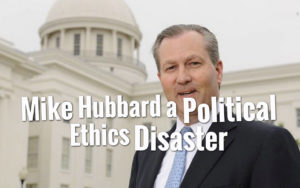Power and money – just two components of what earned from Alabama House Speaker Mike Hubbard a four year prison sentence for violating the state’s ethics law. From improperly soliciting lobbyists and companies for consulting contracts to using his office  to benefit his clients, Hubbard found himself convicted on a range of, what I call political ethics, violations.
to benefit his clients, Hubbard found himself convicted on a range of, what I call political ethics, violations.
A career in shambles…
Hubbard spent 18 years in the Alabama Legislature, and five as speaker of the House.
“His betrayal of his constituents, his fellow House members, and the citizens of Alabama warrants a strong, meaningful sentence in order to punish him, deter other public officials from violating the Ethics Laws, and help restore the people’s trust in their government,” Acting Attorney General W. Van Davis wrote in a brief ahead of sentencing.
Formerly one of the state’s most influential politicians and a GOP rising star, Hubbard was automatically removed from office after being convicted of a felony. The unfortunate outcome of political ethics gone bad!
What happened to cause this violation of Political Ethics?
When I address groups about ethics issues there are two givens: (1) Ethics lapses don’t start big; and (2) Most Ethics failures are a result of one of three life changes: (a) financial pressures; (b) relationship changes or (c) health issues.
Apparently the political ethics lapse started when Hubbard found himself worried about his personal finances after losing his primary job around the time he was elected speaker.
According to a New York Times article:
Witnesses described regular meetings between Mr. Hubbard and lobbyists, and they spoke of how he had sent emails essentially pleading for consulting work. Mr. Hubbard’s emails were flashed onto a screen and dissected while he sat between his lawyers.
Business leaders also appeared as witnesses — and were asked to discuss why they had each invested $150,000 in Mr. Hubbard’s struggling printing company — and so did a former state senator, who testified under an immunity agreement.
Choices have consequences and it appears that Hubbard facing financial pressures used his power and influence to solve the immediate problem at hand. Whether it’s political ethics or business ethics, the motivation to make ethical missteps has common threads.
The Three Legged Stool…
Research has shown that three behaviors are at the core of what would cause or allow an otherwise ethical person to make unethical and potentially illegal choices. These behaviors are well documented and for those who are charged with detecting fraud (Statement of Auditing Standards #99) are called “the fraud triangle” which applies to all areas of business and political ethics:
Need. Described as perceived pressure that a person is experiencing, is the first and critical component of what motives a person to stray from ethical to unethical. Need may come in a variety of forms. The person who is in too much debt likely experiences financial strain – which was the root of my need. Alice, a church secretary, found her need triggered by her granddaughter’s diagnosis of cancer. Infamous Bernie Madoff’s need was certainly not money; likely, he was triggered by the need to be infallible. Whatever the pressure, need is the core emotional state that starts the ball rolling from a choice that is ethical to unethical. Hubbard’s actions driven by financial need started him on the slippery slope to prison.
Opportunity. It makes no difference what your need may be if you don’t have the opportunity to satisfy it then the unethical and potentially illegal choice fails. Without Opportunity there is no fuel for the potential unethical fire. I was a trusted employee, and with that trust came opportunity. Alice was trusted, and had been for so many years that no one could comprehend she was capable of any unethical activity. Madoff took opportunity founded in trust to a new level. Hubbard used his influence (although he denies that to this day) to solve the problem. His opportunity was his power.
Rationalization. Need combined with opportunity provides a firm foundation, but the glue that holds unethical activity together is the ability to rationalize that what is wrong, is right. If you ask most people found guilty of unethical/illegal behavior, they will tell you they felt their actions were legitimate. I, for example, rationalized that I was not “stealing” money as long as my intent was to pay it back. Further, I solidified this mental game by paying some of the money back. “Surely, I wasn’t guilty of stealing money as long as I was paying it back.” For Hubbard – he became convinced by his own illusion that he never violated the state’s ethics laws. A jury disagreed and a judge sentenced him to prison.
That, of course, is a clear example of “‘stinkin’ thinkin.’” The mind can be tricky and when you combine need with opportunity, and can rationalize bad behavior as good, you have the perfect storm to move from ethical to unethical, and potential illegal, behavior. While we all would like to think that those employed in government would act in the highest and best interests of taxpayers, reality in political ethics is humans are all subject to “stinkin’ thinkin” and once on the slippery slope there’s a very real chance that the outcome will be bad.
Self-serving as it Sounds…
Perhaps the State of Alabama should give me a call. With all that is going on ethically it seems that ethics training should be at the top of the list of priorities.
I’m just sayin’!
YOUR COMMENTS ARE WELCOME!


